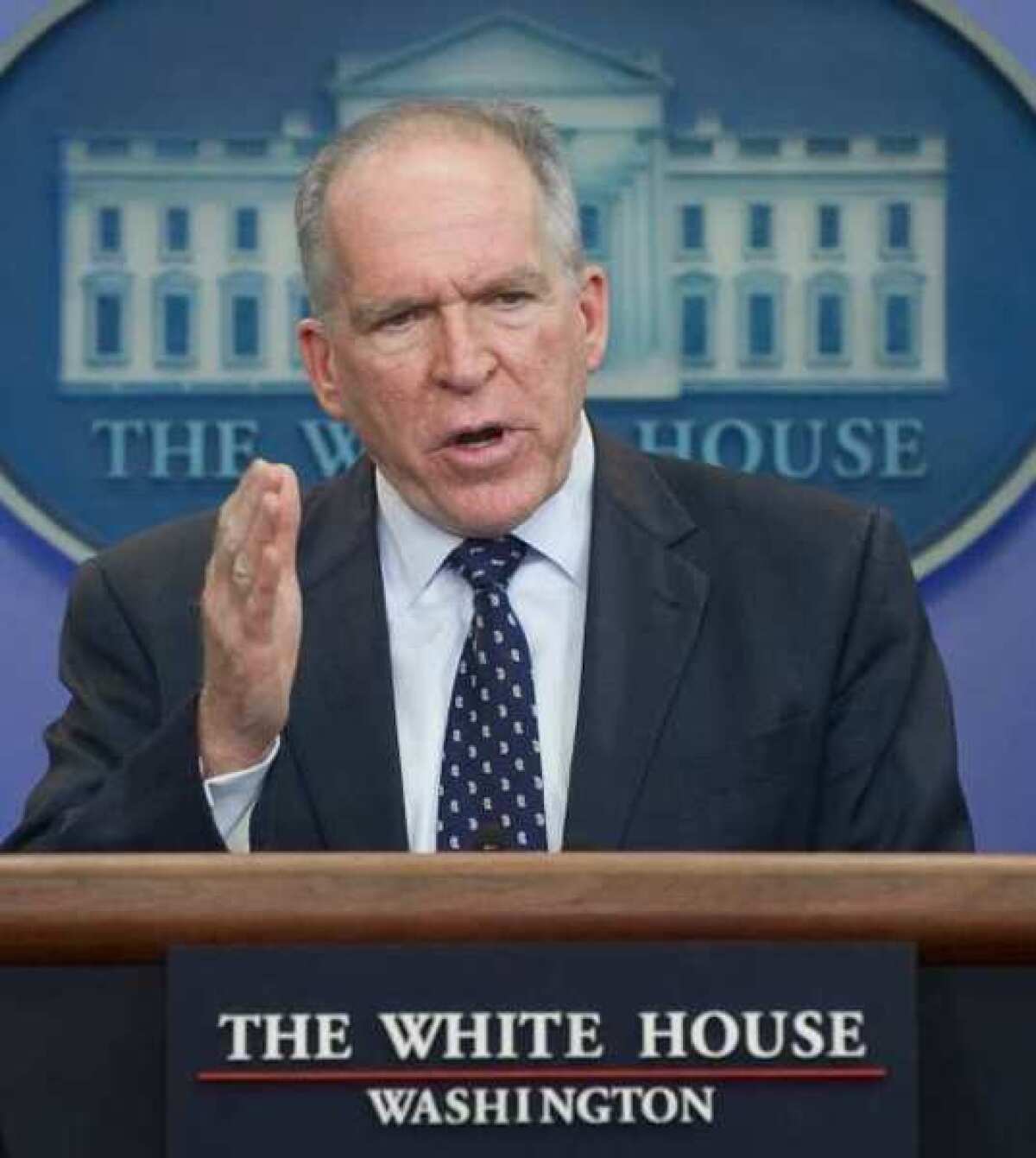McManus: Coming clean on drones

- Share via
In recent weeks, a parade of top officials has given sober, underpublicized speeches explaining why President Obama not only considers “targeted killing” drone strikes against terrorists legal but has massively expanded their use, even approving a strike against a U.S. citizen, the New Mexico-born Al Qaeda preacher Anwar Awlaki, in Yemen last year.
Atty. Gen. Eric H. Holder Jr. gave a lecture arguing that the government has a right to kill U.S. citizens who practice terrorism as long as it observes some form of “due process” in its secret decision-making. The chief lawyers of the State Department and Defense Department weighed in as well.
And last week, Obama’s closest advisor on terrorism, John O. Brennan, defended the administration’s use of drones as “legal, ethical and wise.”
The decision to fire a missile at someone on the ground is made with “extraordinary care and thoughtfulness,” Brennan said.
He said the strikes were reserved for use against people who pose “a significant threat” to the United States. “We do not engage in lethal action in order to eliminate every single member of Al Qaeda,” he said.
Drone strikes are approved, Brennan said, only if it’s impossible to capture a suspect, only if innocent civilians won’t be hurt (“except in the rarest of circumstances”) and only “if we have a high degree of confidence that the individual being targeted is indeed the terrorist we are pursuing.”
So why don’t I find this reassuring?
The administration should be applauded for lifting the veil of secrecy even slightly on the drone attacks, which for years weren’t even officially acknowledged. (Most of them are still officially covert.) Americans have a right to know how their government makes these decisions. The people living in countries that are being bombed are entitled to an explanation too; we’re unlikely to win many hearts and minds solely by buzzing them with drones.
But there is still too much that Brennan and his colleagues aren’t divulging. The administration hasn’t spelled out who makes the decision to approve a drone strike, or how many levels of review such a decision gets. Brennan said Congress exercises oversight of the operations, but there has been no clear explanation of that process either. And the administration hasn’t publicly addressed the practice of “signature strikes” — drone attacks against targets whose identities aren’t known but who fit the profile of enemy combatants — except to say they are considered “with similar rigor.”
In short, the administration’s explanation of its decision-making still boils down mostly to “trust us.” And if that isn’t enough, administration officials add, trust Congress, which is keeping an eye on these programs through its intelligence and armed services committees.
But there’s the problem. The history of congressional oversight over the last half-century isn’t all that reassuring. Members of the intelligence committees say they’re devoting serious attention to the drone programs, but they’ve done little to show the public that their vigilance is real.
And why should they? They’re under virtually no public pressure to do so. Americans love the idea of high-tech weapons that kill terrorists without putting U.S. troops in danger. An ABC News/Washington Post poll in February found that 83% of Americans approve of the use of drones, including 77% of liberal Democrats.
The public opinion that we need to be wooing on this issue is overseas, especially in places such as Pakistan and Yemen, where most of the drones have been flying.
“We have to win the argument” in those countries, said Jane Harman, who was once the top Democrat on the House Intelligence Committee and now heads the Woodrow Wilson International Center for Scholars. “The clearer we can make our policies and the better we can explain them … the greater chance we have to persuade a would-be suicide bomber about to strap on a vest that there is a better answer.”
According to estimates by the independent Long War Journal, the missile strikes have killed more than 2,200 fighters from Al Qaeda and its allies in Pakistan and more than 200 in Yemen. But they’ve killed innocent civilians too. In Pakistan, they’ve touched off a political uproar that has made it more difficult for that country’s military to cooperate with U.S. counter-terrorism efforts. Because of the backlash, the administration has cut drone strikes over Pakistan dramatically, from a high of 117 in 2010 to only 11 so far this year.
In Yemen, meanwhile, the drones have reportedly been effective in decapitating the Al Qaeda branch that U.S. officials consider most dangerous, but they may also have driven more civilians to join up.
There’s one more reason the administration and Congress need to lift the veil of secrecy higher. Someday, other countries will deploy killer drones too, and they may not all be our friends. We have a chance now to set precedents and propose rules that we’d like to see other countries such as China and Russia live by, even if they’re unlikely to meet every standard we might want.
The United States has led the way in the technology of drones and their use in a new form of warfare. Now it’s in our interest to lead in law, ethics, wisdom — and openness as well.
More to Read
A cure for the common opinion
Get thought-provoking perspectives with our weekly newsletter.
You may occasionally receive promotional content from the Los Angeles Times.










